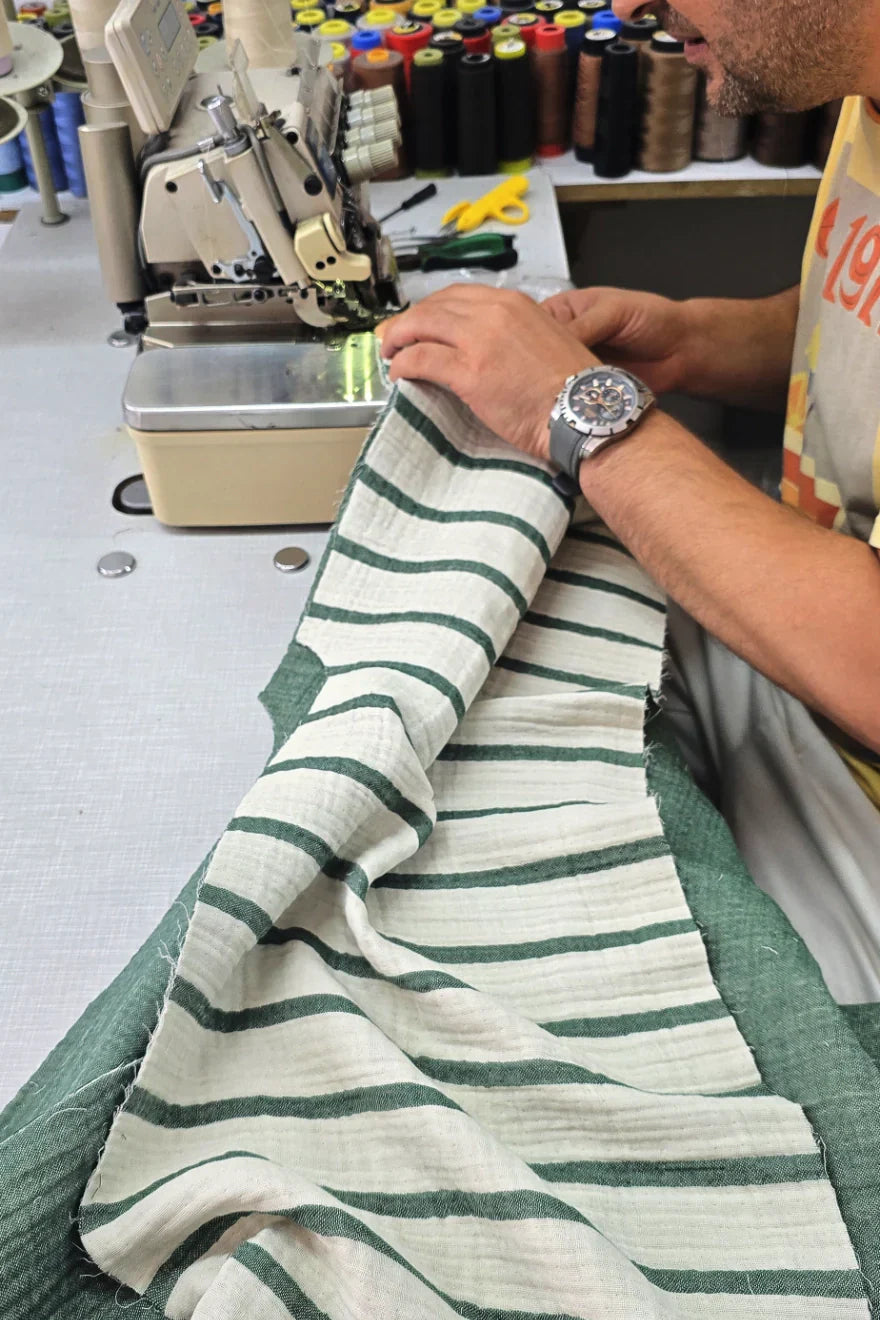From the hands that make it — to the people who choose it.
What if your clothes could speak?
Not about trends or aesthetics — but about care, dignity, and the world you quietly support every time you get dressed. What if every seam reflected the hands that shaped it, the pace they worked in, and the respect they received?
That’s not branding. That’s fashion activism. And for us, it’s the only way forward.
What Fashion Activism Means — For Us, and For You
Fashion activism isn’t a campaign or a hashtag. It’s a commitment — built into every choice we make as a brand, and every choice you make as someone who wears what we create.
It’s about asking:
- Who made this?
- How were they treated?
- What does this piece say about the values I carry?
This movement is personal — especially for those who have stopped settling for surface-level storytelling. People are no longer content with promises that sound good but hide corners cut behind closed doors.
You’ve probably seen it, too: even brands once trusted for their craftsmanship now facing backlash for hiding unfair practices under luxurious labels.
That’s not fashion. That’s deception. And it’s exactly what conscious customers — like ours — are choosing to walk away from.
It Starts With Who Makes Your Clothes
There’s a reason we speak often about the people behind your garments. They matter — not just as workers, but as craftspeople, as human beings, as the soul of this entire process.
In many parts of the industry, production happens in shadows. The people sewing the seams are overworked, underpaid, and invisible. But that’s never been acceptable to us.

Our pieces are shaped in a clean, respectful studio. By people we’ve known for years.
We laugh together, drink tea together, talk about kids and life between stitches. That rhythm becomes part of the clothing — not just in form, but in feeling.

So when we say we care about ethical fashion, we’re not pointing at policies. We’re pointing at people.
Slow Fashion Isn’t About Less — It’s About More of What Matters
Some think the slow fashion movement is about minimalism. But the heart of it isn’t minimal — it’s intentional.
Slow fashion means time: time to design with care, to cut fabric mindfully, to restitch if something’s not quite right. It means leaving space for people — not pushing them to meet deadlines that crush the spirit of craftsmanship.
It also means we don’t flood you with weekly releases. We make what’s worth making, in shapes worth keeping. Clothes that live with you, not just on you.
That’s not nostalgia. That’s sustainable fashion activism in action.
For Women and Men Who Value Integrity
We design for real bodies, real lives, and real values. That means women who want softness without fragility. Men who seek quiet elegance with a conscience. People who care about what goes on their skin — and what’s behind the label.
Too often, ethical fashion brands are talked about as a women’s movement. But in our experience, men are just as present — asking smart questions, making considered purchases, and choosing quality that respects both form and ethics.
Odana’s is for all of them. For you.
What Is Ethical Fashion — When You Strip Away the Buzzwords?
Let’s break it down.
What is ethical fashion, really?
It's not just organic fabric or neutral color palettes. It's everything from the working conditions in the studio to how much fabric waste we generate. From how sizes are graded, to whether packaging can be reused instead of tossed.
Here’s what we believe it should include:
- Thoughtful use of natural and low-impact materials
- Transparent production — no mystery factories
- Work environments where people are treated with respect
- Size inclusivity not as an exception, but as a standard (XS to 4XL)
- Packaging that doesn't become tomorrow’s trash
Ethical fashion doesn't need to shout. But it should always answer your quiet questions with clarity.
It’s Not a Niche — It’s the Future of Getting Dressed
This isn’t about being niche or alternative anymore. It’s becoming the expectation.
More of you are asking: “Who’s behind this fabric?”
And we’re here to answer with honesty, every time.
We won’t sell illusions. No hidden labor. No greenwashed marketing.
Just the real effort of a small team that cares deeply — about the fabric, the fit, and the hands that bring them to life.
Because when you wear Odana’s, you’re wearing something more than an outfit. You’re wearing a philosophy stitched with care, patience, and principle.
What You Support Lives in What You Wear
Clothing doesn’t need a logo to make a statement.
Sometimes, the biggest statement is silence — the kind that comes from knowing your choices didn’t exploit someone else’s reality.
That’s what fashion activism really looks like.
Not performative. Not loud.
Just rooted in action — and worn with quiet pride.
A Final Thread
You don’t need to be an activist to practice sustainable fashion activism.
You just need to care enough to ask, “Who made this, and why?”
And when the answer includes respect, transparency, and integrity — that’s when fashion becomes more than fashion. It becomes part of something better.
You’re not just wearing a look.
You’re wearing your values.




